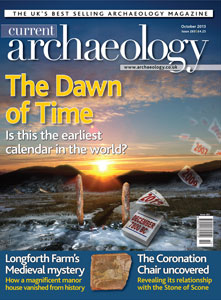Mesolithic hunter-gatherers have traditionally been seen as powerless in the face of their environment. Rather than tailoring it to their needs with permanent homes, burial chambers, or fields, they were forced to keep on moving in an endless quest for food. Now a monument in Aberdeenshire has been found to date to the Mesolithic – surprising enough in itself, but a new study reveals that this inconspicuous pit alignment could have served as a rudimentary calendar. Did these prehistoric itinerants master time thousands of years earlier than thought?
The Romans went to great lengths to tame nature. But what happened to their works during the dying days of Roman Britain? A hoard of cut-up silver found at Traprain Law in 1919 was initially seen as booty won from Continental raids. New research reveals that the precious metal was cut into set weights, its exquisite decoration only valuable as its silver content. What does this hoard reveal about life in the imperial twilight?
The demise of a massive Medieval complex discovered at Longforth Farm in Somerset is also exciting debate. Found by chance during development work, investigation revealed a mysterious absence of both the rubble created by natural collapse and the detritus left by stone robbers. How did this luxury residence vanish from history?
Finally, the Coronation Chair has fallen victim to more robbing than you might imagine. For centuries slivers of wood have been sliced off as souvenirs. In honour of the Diamond Jubilee the Chair received its first full archaeological study. We reveal the secret history of a Medieval throne, and the story of its relationship with the Stone of Scone.
FEATURES/n
/n
MESOLITHIC TIMELORDS/n
A monumental hunter-gatherer ‘calendar’ at Warren Fields, Scotland
Does an enigmatic 9,800-year-old pit alignment represent evidence of rudimentary timekeeping, thousands of years before the dawn of agriculture?
HILLFORT AND HACKSILBER/n
The real meaning of the Traprain treasure
Exploring the latest interpretations of a remarkable hoard of Late Roman silver, found on a Scottish hillside in 1919.
DISCOVERING LONGFORTH FARM/n
On the trail of a Medieval mystery
Development-led excavation in Somerset has uncovered a previously undocumented Medieval building complex. Monastery, manor house, or bishop’s palace? We examine the evidence.
THE CORONATION CHAIR/n
Anatomy of a Medieval throne
Built in the 13th century, the Coronation Chair has witnessed the crowning of generations of English monarchs. What can new research reveal about its evolution – and the iconic Stone of Scone?
NEWS/n
Maerdy’s Mesolithic masterpiece; Ancient artwork from the Ness of Brodgar; Thames Valley tool-making, 7,000 BC; A flood of drought discoveries; Excavating the Peterloo Barracks; Leicester Grey Friars: lifting the lid; Drum Tower’s chambers of secrets; Uncovering pre-Conquest Wakefield
REGULARS/n
Context
An Anglo-Saxon enigma at Oakington, Cambridgeshire
Reviews
Viking Art; Under Another Sky; Masters of the Planet
Sherds
Chris Catling’s irreverent take on heritage issues
Last word
Andrew Selkirk celebrates the work of Brian Philp, Director of Kent Archaeological Rescue Unit
Odd Socs
The Churches Conservation Trust

